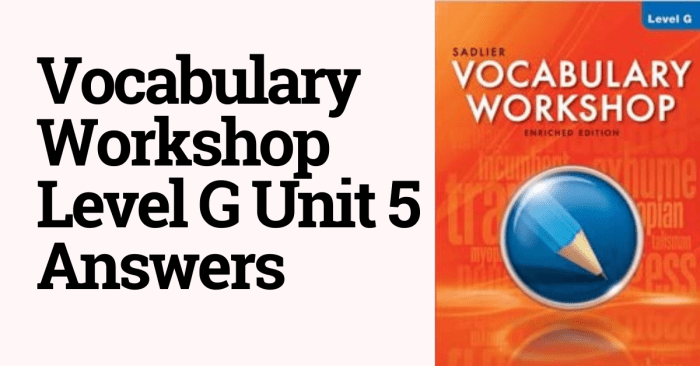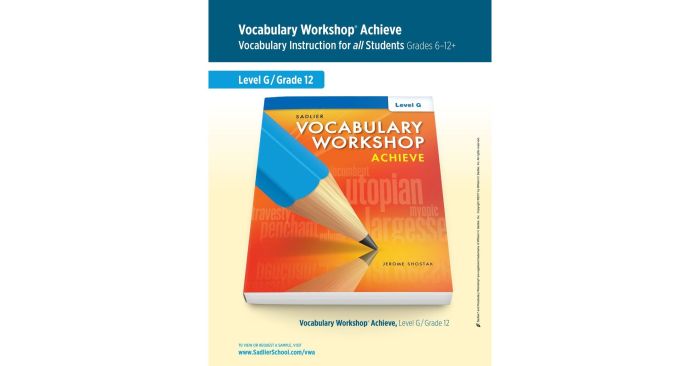Embarking on a linguistic adventure, we delve into the realm of Vocabulary in Action Level G, where words take center stage as powerful tools for effective communication. Join us as we explore the intricacies of this lexical landscape, uncovering its significance and delving into practical methods for teaching, assessing, and reinforcing vocabulary mastery.
At the heart of Level G lies a treasure trove of vocabulary words that enable individuals to express themselves with precision, clarity, and nuance. These words form the building blocks of meaningful conversations, compelling writing, and impactful presentations, empowering us to navigate diverse social and academic contexts with confidence.
Vocabulary in Action Level G
Vocabulary in Action Level G represents the advanced vocabulary skills that are essential for effective communication in various contexts.
This level encompasses words that are commonly used in academic, professional, and social settings. Mastering these words enables individuals to express complex ideas, engage in sophisticated discussions, and comprehend a wide range of written and spoken materials.
Examples of Vocabulary Words in Level G
- Abrogate:to formally annul or repeal a law, treaty, or agreement.
- Egregious:conspicuously bad or offensive.
- Laconic:using few words; concise.
- Magnanimous:generous or forgiving, especially towards a rival or someone who has wronged them.
- Zenith:the highest point or culmination.
Importance of Vocabulary in Action Level G
Vocabulary in Action Level G is crucial for effective communication because it allows individuals to:
- Express themselves clearly and precisely, even in complex situations.
- Understand the nuances and subtleties of language, enabling them to interpret messages accurately.
- Engage in meaningful conversations and discussions, contributing to intellectual discourse.
- Comprehend a wide range of texts, including academic papers, professional documents, and literary works.
- Expand their knowledge and understanding of the world, as words are the building blocks of ideas and concepts.
Methods for Teaching Vocabulary in Action Level G
Teaching vocabulary in Action Level G requires a multi-faceted approach that combines effective methods and real-life applications. By implementing engaging strategies, educators can foster a dynamic learning environment where students actively acquire and retain new words.
Incorporating Vocabulary into Real-Life Situations
To make vocabulary learning meaningful, it’s essential to connect new words to students’ everyday experiences. Consider the following techniques:
- Contextualized Reading:Provide texts that expose students to vocabulary in authentic contexts, such as news articles, short stories, or non-fiction books.
- Real-Life Objects:Bring tangible objects into the classroom that represent the target vocabulary. Encourage students to interact with these objects and use the associated words.
- Role-Playing and Simulations:Create scenarios that require students to use the target vocabulary in realistic situations. This allows them to practice using words in a meaningful way.
Assessment of Vocabulary in Action Level G

Assessing student understanding of vocabulary in Vocabulary in Action Level G is crucial for monitoring progress and ensuring effective teaching. Various methods can be employed to assess student learning, including:
Formal Assessments
- Vocabulary Tests:Formal tests can be administered at regular intervals to assess students’ knowledge of new words and their ability to use them in context.
- Writing Assignments:Writing assignments, such as essays or short stories, provide opportunities for students to demonstrate their vocabulary skills by using the target words correctly and effectively.
- Oral Presentations:Oral presentations allow students to practice using the vocabulary in a meaningful context while also developing their communication skills.
Informal Assessments
- Class Discussions:Class discussions encourage students to actively engage with the vocabulary and demonstrate their understanding through participation.
- Vocabulary Games:Games, such as charades or word puzzles, can make vocabulary learning more engaging and provide informal assessment opportunities.
- Student Self-Assessment:Encouraging students to self-assess their vocabulary knowledge helps them develop metacognitive skills and take ownership of their learning.
Importance of Ongoing Assessment
Ongoing assessment is essential for tracking student progress and adjusting instruction accordingly. By regularly assessing students’ vocabulary skills, teachers can identify areas where students need additional support and tailor their teaching to meet their individual needs. Ongoing assessment also provides students with feedback on their progress and helps them stay motivated to learn new words.
Activities and Games for Reinforcing Vocabulary in Action Level G

Engaging activities and games are essential for reinforcing vocabulary in action level G. These activities should promote collaboration, interaction, and make learning fun and memorable.
Word Charades
In this game, students take turns acting out vocabulary words while their team guesses. This activity encourages physical movement, creativity, and collaboration.
Vocabulary Pictionary
Similar to charades, students draw vocabulary words on a whiteboard or paper while their team guesses. This activity enhances visual learning, fine motor skills, and teamwork.
Vocabulary Scavenger Hunt
Hide vocabulary words around the classroom or school and provide clues to students. This activity promotes exploration, problem-solving, and reinforces vocabulary in a real-world context.
Vocabulary Bingo
Create bingo cards with vocabulary words and have students listen to sentences or read passages to mark off words they hear or read. This activity enhances listening comprehension, reading fluency, and vocabulary recognition.
Vocabulary in Action Level G offers an engaging and interactive way to expand your vocabulary. It’s a great way to learn new words and improve your understanding of the English language. For example, you can explore the anatomy of a frog worksheet to learn about the different parts of a frog’s body.
This can help you develop a deeper understanding of biology and the natural world. By incorporating interactive exercises and real-world examples, Vocabulary in Action Level G makes learning vocabulary fun and effective.
Vocabulary Memory Match
Create pairs of cards with vocabulary words and definitions or synonyms. Students flip over cards to match pairs, improving memory, concentration, and vocabulary retention.
Strategies for Incorporating Technology into Vocabulary for Action Level G
Technology can be a powerful tool for enhancing vocabulary learning. This section explores various ways to incorporate technology into vocabulary instruction for Action Level G, leveraging online resources, apps, and software to facilitate effective and engaging learning experiences.
Online Resources
The internet offers a wealth of online resources for vocabulary building. Websites such as Vocabulary.com and Merriam-Webster provide interactive exercises, games, and quizzes that make learning new words fun and engaging. These resources allow students to practice their vocabulary skills in a self-paced and interactive environment.
Apps, Vocabulary in action level g
There are numerous apps available for mobile devices that can help students build their vocabulary. Apps like Quizlet and Anki use flashcards and spaced repetition techniques to help students memorize and retain new words. Other apps, such as Duolingo and Babbel, offer interactive lessons and games that make learning new languages, including vocabulary, enjoyable and accessible.
Software
Vocabulary-building software programs can provide students with a structured and comprehensive approach to vocabulary learning. Programs like Rosetta Stone and Berlitz offer interactive lessons, exercises, and assessments that help students develop their vocabulary skills in a systematic and engaging way.
These programs often incorporate multimedia elements, such as audio and video, to enhance the learning experience.
Technology-Based Activities
In addition to online resources, apps, and software, there are numerous technology-based activities that can be used to reinforce vocabulary learning. These activities can be incorporated into classroom instruction or used as homework assignments to provide students with additional practice and engagement.
- Online Games:Online games like Word Scramble and Crossword Puzzles can be used to reinforce vocabulary learning in a fun and challenging way.
- Virtual Field Trips:Virtual field trips to museums, historical sites, or other educational destinations can expose students to new vocabulary related to the topic of the trip.
- Digital Storytelling:Using digital storytelling tools, students can create their own stories or presentations that incorporate new vocabulary words.
- Collaborative Projects:Collaborative projects, such as creating a class wiki or online glossary, allow students to work together to build their vocabulary and share their knowledge.
Helpful Answers
What is the significance of Vocabulary in Action Level G?
Vocabulary in Action Level G provides individuals with the essential words and phrases to communicate effectively in a variety of situations, enhancing their ability to express themselves clearly and confidently.
How can I effectively teach Vocabulary in Action Level G?
Effective teaching methods for Vocabulary in Action Level G include incorporating real-life examples, using interactive games and activities, and providing ongoing feedback to students.
What are some strategies for assessing Vocabulary in Action Level G?
Assessment strategies for Vocabulary in Action Level G include oral presentations, written exercises, and interactive quizzes that evaluate students’ understanding and application of vocabulary words.